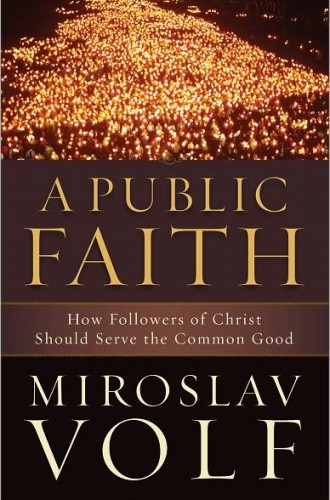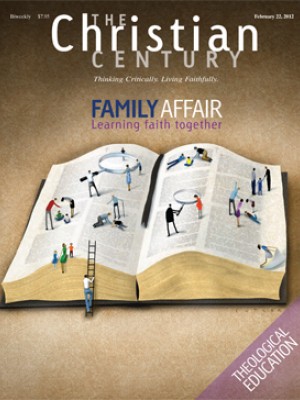A Public Faith, by Miroslav Volf
Of the rewriting of H. Richard Niebuhr's Christ and Culture there shall be no end. Miroslav Volf is too sophisticated a theologian to rehash or imitate Niebuhr's celebrated fivefold schema, but A Public Faith, like other contemporary forays into this well-traveled territory (one thinks of James Davison Hunter's To Change the World), remains in the shadow of Niebuhr's defining work.
Volf is clear that there is no single model for Christian interaction with the "world." There can be no unmitigated opposition or whole-scale transformation. Instead, Volf advocates a blend of "accepting, rejecting, learning from, transforming, and putting to better uses various elements of an internally differentiated and rapidly changing culture." So why write this book, if there is no compelling argument to make or focal image to propose? If encounter is best imagined as a series of ad hoc relationships based on appropriate witness in diverse contexts, then why labor, from various angles, to advance a theory that there is no theory?
Read our latest issue or browse back issues.
The answer is simple—and threefold. Christians have often got this answer badly wrong, whether in favoring a domineering presence or an otherworldly absence. And those most eager to advance an unapologetic public presence of faith are often those like Sayyid Qutb, the "godfather of radical Islam"—in short, advocates whose perceptions do not always advance the common good.
So the motivation behind this book is wholly laudable. Volf is always engaging, in part because his citation of other authors is so apposite. He quotes Gotthold Ephraim Lessing advising Jews, Christians and Muslims in the following unambiguous terms (and this is 1779, remember): "Let each of you rival the others only in uncorrupted love, free from prejudice. Let each of you strive to show the power of [your religion]. Come to the aid of this power in gentleness, with heartfelt tolerance, in charity, with sincerest submission to God."
Can the respective religions, over 200 years after Lessing, prove themselves enablers of uncorrupted love? It may be a utilitarian question, but if all utilitarian questions were like that, none of us would need to bother with virtue ethics. Such use of Lessing dismantles the notion that interfaith dialogue is an imperative dreamt up since 9/11. People like Lessing have been on the case for a while.
Volf quotes Michel de Certeau in similar fashion. He invokes Certeau's notion of "leaving without departing" as a middle ground, for Christians, between abandoning culture and dominating it. Certeau points out that from 1492 onward, native peoples in the Americas lived within the laws and practices imposed upon them, but turned them "to ends other than those of their conquerors; they made something else out of them; they subverted them from within. They metaphorized the dominant order; they made it function in a different register. They diverted without leaving."
What is exasperating about this book is that it contains two potentially governing images—one about our relation to other faiths (rivaling one another only in uncorrupted love) and the other about our relation to the civil order (diverting without leaving)—either of which could have shaped the whole argument, yet it explores neither in any detail. Instead it devotes large swaths of space to an anthropological consideration of what constitutes religious malfunction and to sweeping historical surveys of what promotes human flourishing. Volf is well placed to dig deep into specific, perhaps extensively anecdotal soil to illustrate, test and expound the dimensions of generous, promising and expansive notions of what he calls public faith, but he would be better off leaving the sociological perspectives to someone else. (Do we really need to go back to Max Weber and Ernst Troeltsch on church and sect yet again?) I'm all for brief books that reach a wide public; but that means renouncing a lugubrious sequence of opening chapters that clear one's throat when one is already standing before the microphone.
No one needs yet another diagnosis of why Christianity struggles to relate to culture—certainly not one in which the church is such a vague reality and culture is such a monolithic behemoth. What is urgently needed is something H. R. Niebuhr never gave: a nuanced, thick, inspiring yet humble manifesto for what such engagement and witness might look like and what its goals and criteria for success might be, along with examples of where it is currently being modeled appropriately.
It's not as if Volf doesn't have the right material at hand. Here is perhaps the most tantalizing sentence in the book: "Let me briefly note some key elements of forgiveness and relate them to the wrongdoing that happens when Christians and adherents of other religions share wisdom poorly." Volf has just noted, vitally, that forgiveness is "the defining stance of Jesus Christ, wisdom personified, and a central pillar of the Christian way of life." So why not give us half a book about how forgiveness shapes interfaith and intercultural relations? Why revert to the survey method? And why introduce, yet again, the apparently considerate but in fact evasive word briefly?
At best you could call this book a potpourri of nuggets left out for future graduate students to graze on as they identify themes for doctoral investigation or for pastors to mine for themes for a sermon series. (There are plenty here.) At worst you could call it a dilettante's dance through key issues of Christian social and interfaith engagement that pauses occasionally, dwells intriguingly and settles nowhere. Strengthened by Volf's footnotes, followers of Christ will set out anew—but an opportunity to help them do the work for themselves has perhaps been lost.








